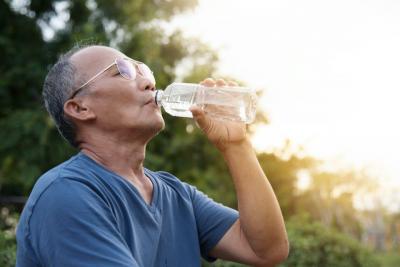Heat Safety: Extended High Temperatures Forecast For Metro Atlanta
FOREST PARK, Ga. — June 16, 2022 — According to the National Weather Service, heat is one of the leading weather-related killers in the nation, resulting in hundreds of fatalities each year. With temperatures forecast to reach the high 90s and heat index values expected to top 100 degrees for the next several days, the Georgia Department of Public Health and Forest Park Fire and Emergency Services are urging residents to avoid prolonged exposure to the heat and sun and to limit strenuous outdoor activity to prevent heat-related illnesses.
To protect your health when temperatures are extremely high, remember to stay cool, stay hydrated and stay informed.
Stay Cool
- Wear lightweight, light-colored, loose-fitting clothing.
- Stay in an air-conditioned place. If your home does not have air conditioning, go to the shopping mall or public library or a friend or relative’s home – even a few hours spent in air conditioning can help your body stay cooler when you go back into the heat.
- Electric fans may provide comfort, but when the temperature is in the high 90s, fans will not prevent heat-related illness. Taking a cool shower or bath is a much better way to cool off.
- NEVER leave infants, children, adults or pets in a parked car, even if the windows are cracked open. If you see anyone locked in a hot vehicle, call 911.
Stay Hydrated
- Drink plenty of water even before you are thirsty. Don’t wait until you are already thirsty.
- Avoid sugary or alcoholic beverages which can cause you to lose even more body fluid.
- Beware that very cold drinks can cause stomach cramps. As you lose salt and minerals from your body while sweating, replace them. A sports drink will help with this.
Stay Informed
- Prepare for extreme heat ahead of time by keeping an eye on local weather forecasts.
- Use the buddy system to check on each other at least twice a day while working in extreme heat. Heat-related illness can cause confusion or loss of consciousness.
- Keep a close eye on those at greater risk for heat-related illness, including infants and people 65 years of age or older.
Don't Forget Your Pets
- Anytime your pet is outside, make sure they have protection from the heat and sun, and that they have plenty of fresh, cold water.
- In heat waves, add ice to water for your pet to drink when possible.
- A doghouse does not provide relief from heat — in fact, it makes it worse.
For more information about extreme heat and ways to prevent heat-related illnesses, visit www.weather.gov/safety/heat.

